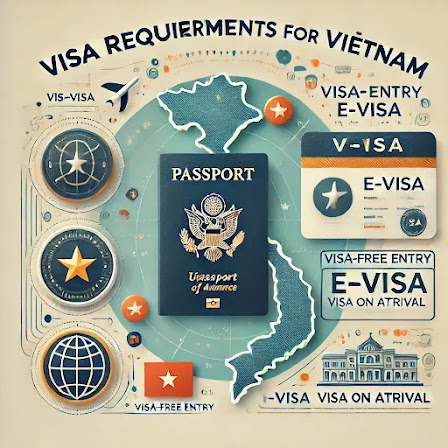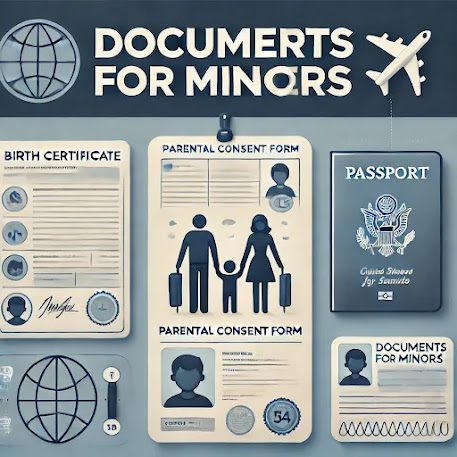- Get link
- X
- Other Apps
Discover cheap flights and save big
- Get link
- X
- Other Apps
🔔Table of Contents
- Passport: Your Primary Travel Document
- Visa Requirements for Vietnam
- Travel Insurance: Highly Recommended
- COVID-19 Travel Requirements (If Applicable)
- Proof of Accommodation
- Return or Onward Travel Ticket
- Financial Proof (If Requested)
- Vaccination Records
- Additional Documents for Special Purposes
- Documents for Minors
- Copies of Important Documents
- Preparing for Your Trip
- Conclusion
What Documents Do I Need to Travel to Vietnam?
Vietnam, known for its breathtaking landscapes, rich cultural heritage, and bustling cities, has become a favorite destination for travelers worldwide. But before packing your bags and heading to this Southeast Asian gem, ensuring that you have all the required documents for a hassle-free journey is essential. This comprehensive guide will walk you through everything you need to prepare for your trip to Vietnam, helping you avoid last-minute stress and ensuring a seamless travel experience.
1. Passport: Your Primary Travel Document
Validity Requirements
A valid passport is the cornerstone of your travel documentation. To enter Vietnam, your passport must meet the following criteria:
- It should have at least six months of validity remaining from your planned date of entry.
- It must contain at least two blank pages for visa stamps.
Passport Check
Before traveling, check the expiration date of your passport. If your passport is close to expiring, apply for a renewal well in advance to avoid complications.
2. Visa Requirements for Vietnam
Depending on your nationality and the purpose of your visit, you may need a visa to enter Vietnam. Here are the options available:
a. Visa-Free Entry
Vietnam offers visa-free entry to citizens of several countries, including:
- ASEAN nations like Thailand, Malaysia, Singapore, Indonesia, and the Philippines.
- Some European countries like Denmark, Norway, Sweden, Finland, and Italy.
- Other countries like Japan, South Korea, and Russia.
Visa-free entry typically allows you to stay in Vietnam for a short duration, ranging from 15 to 30 days, depending on your nationality.
b. e-Visa
For travelers from eligible countries, Vietnam offers an e-Visa system. The e-Visa allows a single-entry stay of up to 30 days. You can apply for an e-Visa online through the official website. The process involves:
- Filling out an online application form.
- Uploading a digital passport photo and a scanned copy of your passport.
- Paying a non-refundable processing fee (approximately $25).
- Receiving your e-Visa approval letter via email.
Ensure you print the e-Visa approval letter to present at immigration upon arrival in Vietnam.
c. Visa on Arrival (VOA)
For travelers who wish to stay longer or require multiple entries, the Visa on Arrival (VOA) is a popular option. However, you must apply for a visa approval letter through a travel agency or visa service before arriving in Vietnam. Once you arrive at the airport, you’ll need to:
- Present your visa approval letter.
- Fill out an entry/exit form.
- Provide two passport-sized photos.
- Pay a stamping fee in cash (USD is commonly accepted).
The VOA is available only at select international airports, including Hanoi, Ho Chi Minh City, and Da Nang.
3. Travel Insurance: Highly Recommended
Although not always mandatory, many travelers are advised to have travel insurance. In some cases, travel insurance may be required when applying for a visa. A comprehensive travel insurance policy should cover:
- Medical emergencies.
- Trip cancellations or delays.
- Lost or stolen belongings.
- Emergency evacuations.
Ensure that your travel insurance policy covers COVID-19-related medical expenses if the pandemic policies remain in place during your visit.
4. COVID-19 Travel Requirements (If Applicable)
As global travel normalizes, some countries, including Vietnam, may still have specific COVID-19-related entry requirements. Depending on the current regulations, you may need:
- Proof of full vaccination (an official vaccination certificate).
- A negative COVID-19 test result (RT-PCR or antigen) taken within a specified time before your travel.
- A health declaration form completed online before arrival.
Always check the latest updates on Vietnam’s health regulations closer to your travel dates.
COVID-19 Travel Requirements Update 2024-2025
As we step into 2025, Vietnam continues to welcome international travelers while maintaining measures to ensure public health and safety. Although the pandemic has largely subsided, some COVID-19-related travel requirements may still be in place. Staying informed about these rules is essential for a smooth and worry-free trip.
5. Proof of Accommodation
Many travelers overlook the importance of having proof of accommodation, but Vietnamese immigration authorities may request this document. Acceptable forms of proof include:
- A confirmed hotel booking.
- An invitation letter from a host (if staying with friends or family).
- Evidence of other pre-arranged lodging, such as Airbnb.
If you're traveling on a flexible itinerary, booking at least the first few nights in Vietnam is wise and having the confirmation details ready for inspection.
6. Return or Onward Travel Ticket
To demonstrate your intent to leave Vietnam before your visa expires, you may be required to present a return ticket or proof of onward travel. This can include:
- A flight ticket back to your home country.
- A ticket to your next destination (if you're traveling to another country after Vietnam).
Make sure to carry digital and hard copies of your travel tickets for easy access at immigration checkpoints.
7. Financial Proof (If Requested)
Although rarely enforced, you may be asked to prove your financial capability to cover your expenses while in Vietnam. This is more common for travelers on long-term or multiple-entry visas. Accepted forms of proof include:
- Bank statements showing sufficient funds.
- Credit card statements.
- Traveler's checks.
8. Vaccination Records
While Vietnam does not mandate specific vaccinations for most travelers, carrying an International Certificate of Vaccination or Prophylaxis (ICVP) is a good practice. The World Health Organization (WHO) recommends vaccinations against:
- Hepatitis A and B.
- Typhoid.
- Japanese encephalitis (for extended stays in rural areas).
Additionally, check if you need a yellow fever vaccination if you’re traveling from a country where yellow fever is endemic.
9. Additional Documents for Special Purposes
a. Business Travelers
If you're traveling for business, you may need:
- A business visa.
- An invitation letter from a Vietnamese company.
- Proof of employment or business registration in your home country.
b. Students
If you're planning to study in Vietnam, you’ll need:
- A student visa.
- Acceptance letter from a Vietnamese educational institution.
- Financial proof for tuition and living expenses.
c. Work Permits
If you’re traveling for work, a work permit or a working visa is required. Your employer in Vietnam will typically sponsor and assist in obtaining this permit.
10. Documents for Minors
If you're traveling with children under 18, additional documentation may be necessary:
- A birth certificate (to prove the parent-child relationship).
- A notarized consent letter from both parents if the child is traveling with only one parent or a guardian.
11. Copies of Important Documents
Carrying both physical and digital copies of your documents is highly recommended in case of loss or theft. These include:
- Passport.
- Visa or e-Visa approval letter.
- Travel insurance policy.
- Hotel bookings and flight tickets.
Store digital copies securely in cloud storage or email them to yourself for easy access.
12. Preparing for Your Trip
Double-Check Requirements
Visa and entry requirements can change, so check with the Vietnamese embassy or consulate in your country before traveling.
Keep Everything Organized
Use a travel document organizer to keep all your essential papers in one place. This will save time and reduce stress during your journey.
Conclusion
Planning a trip to Vietnam requires careful preparation, particularly when it comes to documentation. From ensuring your passport is valid to applying for the appropriate visa and carrying proof of accommodation and onward travel, having all the required paperwork will make your travel experience smooth and enjoyable. Always stay updated on the latest entry regulations and maintain copies of all essential documents. With proper preparation, you’ll be ready to explore Vietnam’s vibrant culture, stunning landscapes, and unforgettable cuisine without any unnecessary hassles.
Now that you know what documents to prepare, it’s time to start planning your Vietnamese adventure!
- Get link
- X
- Other Apps






Comments
Post a Comment